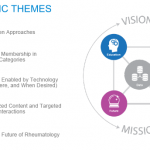The rheumatology textbook need not die a slow death but can be revitalized into a dynamic, relevant and vital resource. We propose that medical subspecialty organizations be the principal repository of subspecialty informatics in the U.S. and take over responsibility for future editions for the following reasons:
- The positions and philosophies of the ACR represent a consensus of Town and Gown from a group of respected rheumatologists who are not entrenched and constantly rotate.
- Input from patients, industry, disease advocacy organizations, other specialties, government, and practice management organizations is considered in rendering guidance, but is not beholden to them.
In contrast, disease advocacy organizations sometimes overemphasize the importance or relevance of their disorders. Key opinion leaders with strong views can have a lot of influence, including or excluding the participation of others in advisory roles. As a result, the inclusion of a young and diverse group of rheumatologists and the interest in addressing healthcare disparities is sometimes overlooked in this setting.
The ACR is uniquely committed to building and sustaining the subspecialty, increasing research, promoting academic education and benefiting practice centers in a fair and balanced way. As such, it should provide the framework for housing a rheumatology subspecialty textbook. In the recent past, other organizations, such as EULAR, have published textbooks, with four rheumatology titles currently available.
In the future, a subspecialty textbook should:
- Be continuously updated online, with the ability to purchase individual chapters or download slides, which enhances affordability. This is now available with some publishers (e.g., Springer). Other companies are transitioning. (For lupus, several chapters don’t change but certain topics warrant regular updating.)
- Engage junior faculty and young thought leaders and present them with the opportunity to participate in the writing.
- Encourage feedback to improve the product through online forums, where key advances can be commented upon by readers.
- Be available and promoted internationally.
- Include an internationally diverse group of authors and editors based on their willingness to cover a topic and take into consideration diversity and inclusivity.
- Represent a consensus of excellence by a central organization that can use its ownership to address topics electronically or in print.
- Be a resource with more rigor and detail than an UpToDate-like review, using well-defined review strategies.
- Try to avoid political influence on editorial choices. In rheumatology, some organizations striving for parity among different countries have ended up potentially compromising quality to satisfy all their constituencies when they published some book titles.
The Potential
The ACR Education Strategic Plan from 2019 and the ACR Strategic Plan call for increasing engagement with members through electronic platforms. The mission is encapsulated by the phrase in the 2022–27 strategic plan: “The ACR is where you are.” The goal is to provide high-quality, unbiased content available to members on demand.

